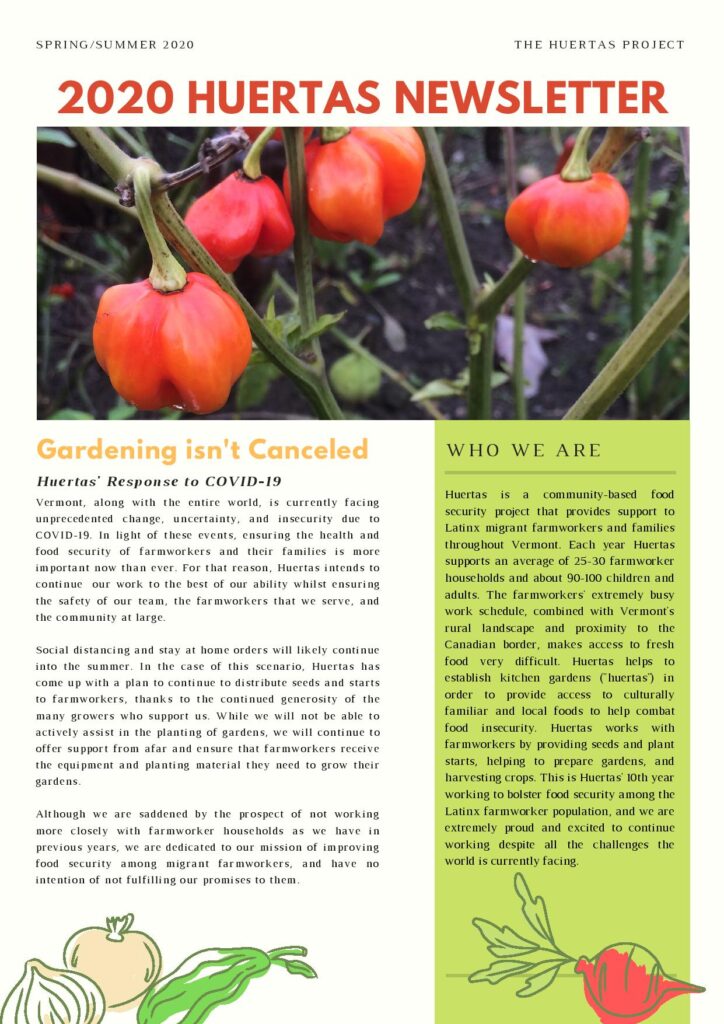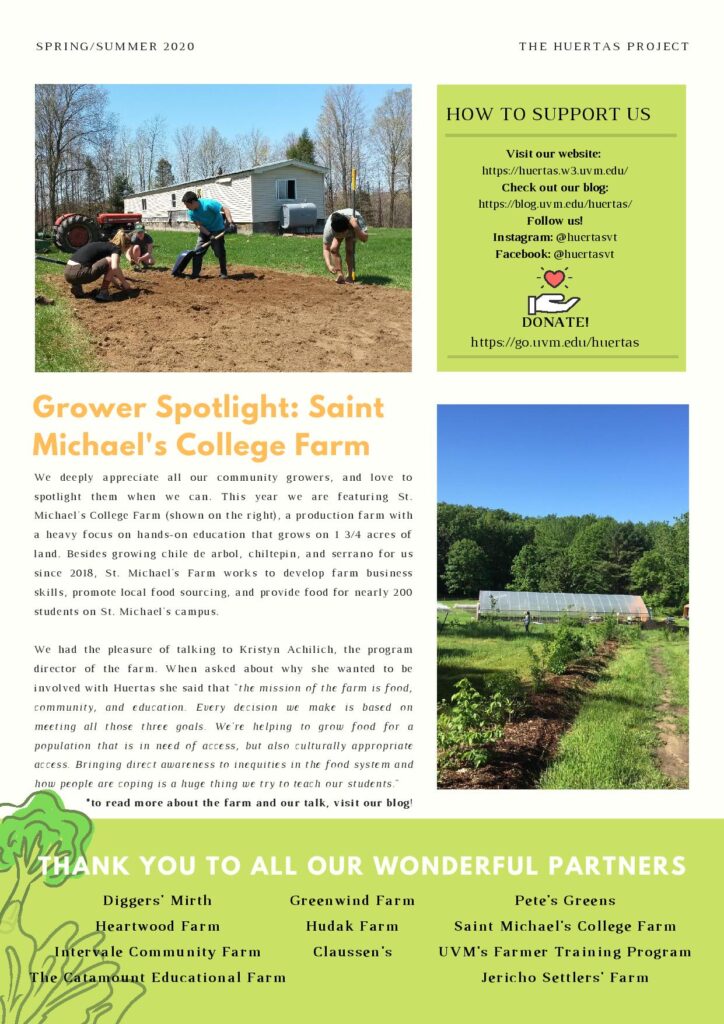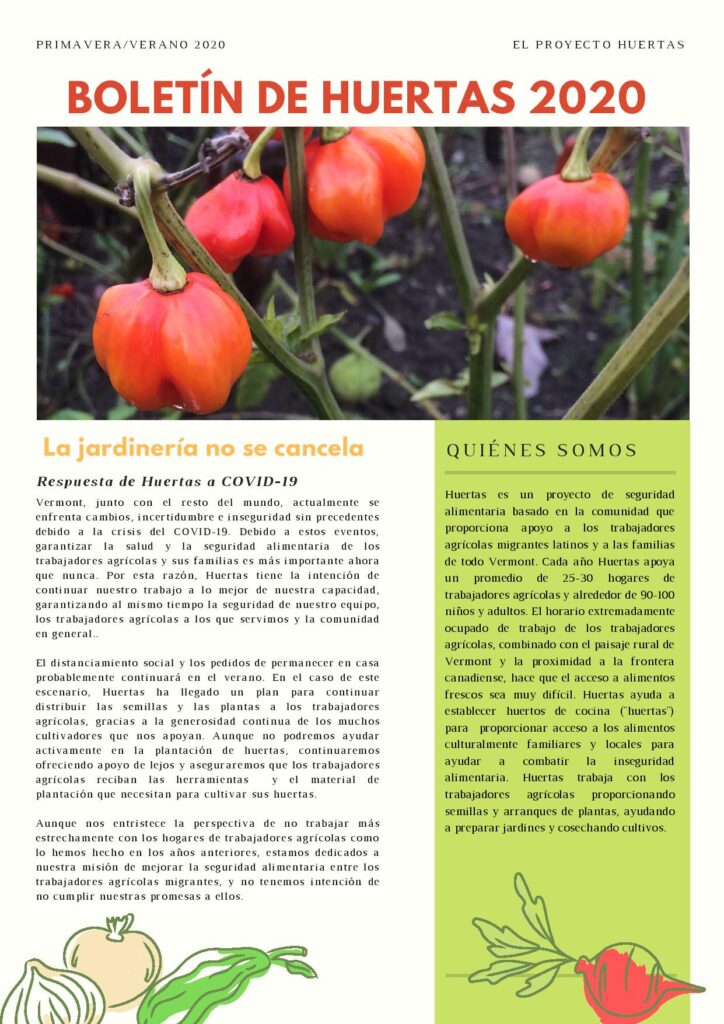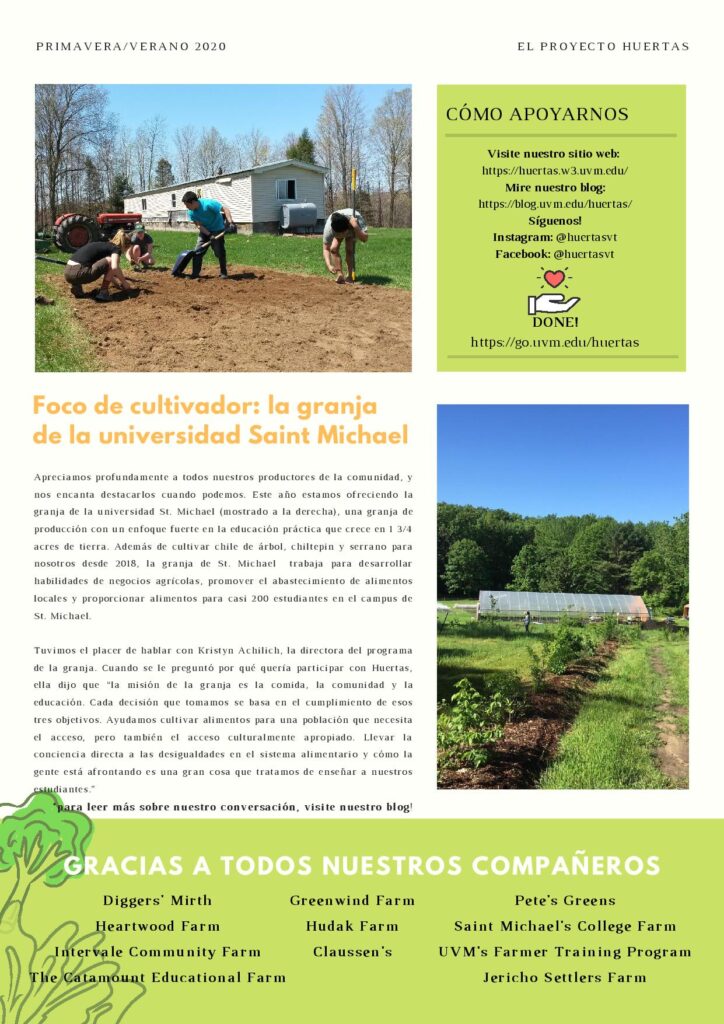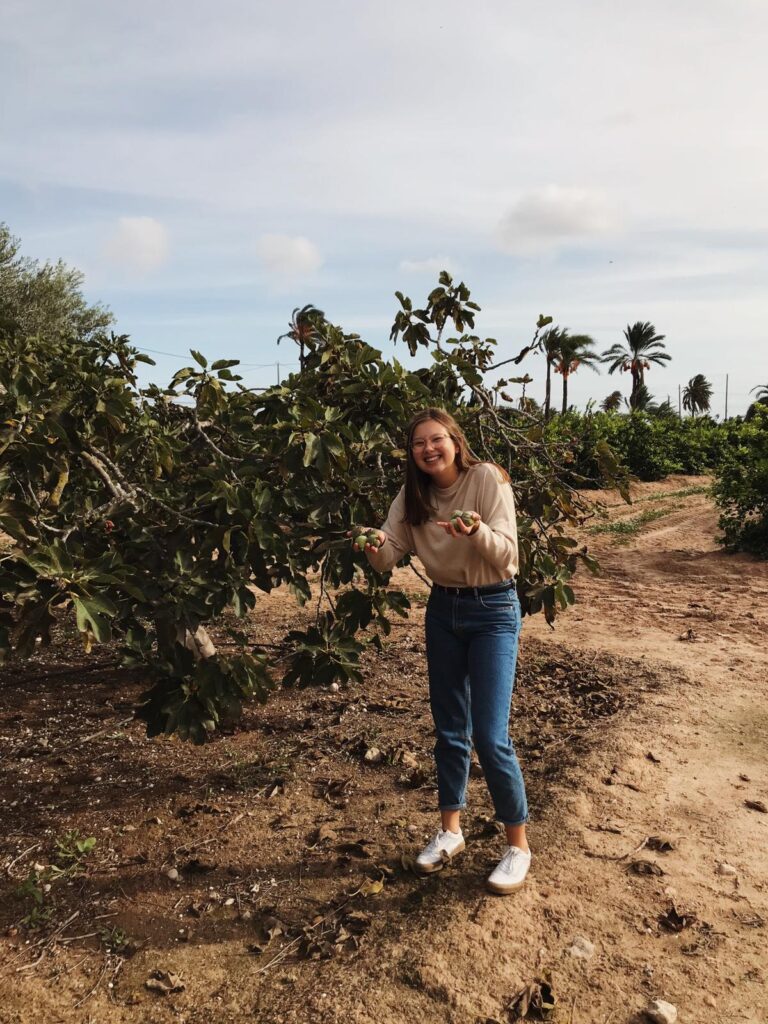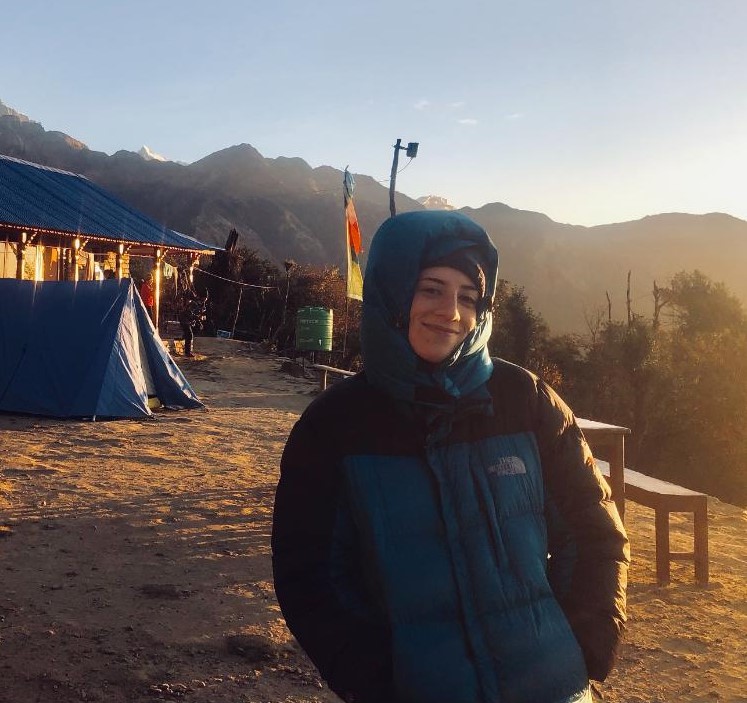I was sure I’d made it to the farthest-flung corner of
Northwestern Vermont. This is where Francisco lived. I was cycling down a dirt
road that had turned to mud, at the foot of a forested mountain. The leaves
that hadn’t yet fallen were red and orange.
That fall morning my bicycle and I had caught the predawn
bus from Burlington to St. Albans. From there, I pedaled through the fields and
towns of Franklin County in search of a few farms where I’d find participants
of Huertas, a project that supports migrant dairy workers and their families to
plant and maintain kitchen gardens. I was going to interview them about their
experiences with the program and their gardens. This was my first interview that day. I had two more scheduled.
I passed
Fransisco’s house by accident. I had a hand-drawn map but there were few
landmarks out here, just narrow fields of already-harvested corn and the odd
barn. A film of snow covered the ground in the shade. I waved at a passing
pick-up, but the driver ignored me.
After arriving at the end of the road, I turned around. I
knocked on the door of the only house I’d seen. Francisco opened with a smile.
We had been in touch the day before, but without contact he had begun to doubt
that I was coming.
He was isolated. “The neighbors here, well there aren’t any
nearby,” said Francisco. Having a visitor seemed to make him happy.
His garden gave him happiness as well. “It’s something fun
and entertaining,” he told me. “I get home from work and have nothing else to
do. So I go out to the garden. It entertains me a lot.” For Francisco, like for
most participants I spoke with, maintaining a garden wasn’t work; it was fun.
And participants valued produced from their gardens more
highly than equivalent purchased food. When I presented them with the
hypothetical option between support from Huertas to maintain a garden and a
weekly produce delivery, 9 of 15 respondents said they would prefer the garden.
Of the 6 who chose the hypothetical veggie box, 5 explained that it was because
of unwanted circumstances: they didn’t have adequate time or space to have
success gardening.
More than anything, the people I interviewed seemed to like
their relationships with their gardens, with the plants that comprised them,
and with the people with whom they gardened and shared food. “What we plant,
what we harvest, we know that we were the ones doing the maintenance and that
we’re eating fresh food,” Francisco explained to me. Other Huertas participants
told me stories about caring for plants with their children and cooking for
their friends with ingredients they had sown and reaped.
What thrilled Francisco was learning from plants through his
interactions with the garden. Nature astonished him. He spoke of his chili
peppers: “Before the snow started to fall, we stopped harvesting them. We had
picked all the chilis, and then they started producing again. … We were going
to buy chilis to stew. My roommate went outside to check on the garden, and
there were more peppers on the plants!”
Later he told me, “Something that surprised me happened with
the cilantro. Well, back in Mexico, you plant it, harvest it, and that’s it.
But this time, the first year I was here, the cilantro was all harvested and we
left a few plants. It grew, it flowered, it made seeds, and there it stayed.
What I realized was that the seeds don’t mind the cold. Cilantro came up right
there the next year. So this year, I left some plants on purpose.” Francisco
marveled at how the chilis and cilantro produced on their own.
“I learn little more every year,” he explained. “Like with
the tomatoes, at first I just planted them and weeded. There they fell over.
Now, I put some sticks beside them and tie them up with a string and they grow
well. They produce better. You harvest more.”
Francisco did not learn only from his own experience with
the plants, but also from Huertas volunteers. “They offered to help me plant,”
he said, speaking of his first year participating. “I had already prepared the
land and everything. They showed me how I was going to plant, the distance
between seedlings, and how to prepare the soil. The next year, I could do it
myself.”
Like most of the people I talked to, Francisco expressed
gratitude for the help of Huertas. “They gave us everything, whatever we asked
for. They brought us plant starts, seeds…”
It was his day off, and he sipped a Corona while we talked.
He offered me one. I told him that it was super tempting, but I had a long way
to cycle that afternoon, so it was best I didn’t drink.
We kept talking after I had turned off the audio recording
device. Francisco told me about the disappearance of the chickens that Huertas
had given him. Whoever had taken off with them hadn’t left behind a single
feather. We laughed thinking about what could have happened. Maybe it had been
a coyote.
I thought that perhaps the company of occasional visits was
the best thing Huertas offered. Diary workers are isolated by distance and
circumstance; they live in the countryside, they work very long hours, and many
are scared to leave the farm because they are undocumented. Having access to
fresh produce from their own culture is a big help, for sure. But maybe it is
just as important to have other people around once in a while.
In the report [Download below this post] that I have written about this program evaluation of Huertas, I recommend that the project seeks an intern who has experienced growing vegetables, to better support participants with their gardens. Many don’t have time to garden because of their work schedules, and some—mostly those from cities, who didn’t farm in Mexico—lacked gardening knowhow. That year Francisco had struggled with his melon plant. “It grew well, but the bugs began to munch on it and they didn’t let the melons get big.”
But beyond whether every crop grows well, I think that what
matters about Huertas is the interaction between student volunteers and migrant
participants. It’s cultural exchange and human relations. It’s fine if I don’t
know anything about gardening; the fact that I came and listened to Francisco
really seemed to make him feel good. Other participants felt good about our
conversations, too. As did I. I loved spending an hour with Francisco, and it
pained me to know that I wasn’t going to be able to come back, at least until
the next spring.
I took off smiling on my bike, on my way to the next
interview. The cows gazed at me uninterestedly as I went by.
Había llegado al
rinconcito más remoto de todo el noroeste de Vermont, de eso yo estaba seguro.
Allá vivía Francisco. Estaba en una carretera de tierra que se había convertido
en barro, al pie de una montaña boscosa. Las hojas que no se habían caído
todavía eran rojas y naranjas.
Aquella madrugada
otoñal mi bici y yo habíamos tomado el autobús de Burlington a St. Albans. De
allí, fui pedaleando por los campos y pueblos de Franklin County en búsqueda de
algunos ranchos donde vivían participantes de Huertas, un proyecto que apoya a
trabajadores migrantes en ranchos lecheros y sus familias para que mantengan
huertas. Les iba a entrevistar sobre sus experiencias con el programa y con sus
huertas. Ésta era la primera entrevista del día. Tenía dos más después.
Pasé la casa de
Francisco sin querer. Tenía un mapa que había dibujado a mano, pero aquí había
pocos puntos de referencia, solo campos estrechos de maíz ya cosechado y algún
granero. En la sombra, una capa fina de nieve tapaba el suelo. Me pasó una
camioneta y le señalé, pero el conductor no me hizo caso.
Al llegar al
final de la carretera, me di la vuelta. Subí a la única casa que había visto y
llamé a la puerta. Francisco me recibió con una sonrisa. Habíamos estado en
contacto el día anterior, pero él dudaba que llegara. Estaba aislado allí. “Los
vecinos aquí, pues no hay muy cerca”, dijo. Tener visita le pareció hacer
feliz.
Su huerta le daba
felicidad también. “Es algo divertido y entretenido”, me dijo. “Llego de mi
trabajo, no tengo más que hacer. Y ya, me voy allá a la huerta. Me entretiene
mucho”. Para Francisco, igual que para la mayoría de los participantes con
quienes hablé, mantener la huerta no era trabajo; era diversión.
Y los
participantes valoraban lo que sus huertas producían más que el equivalente en
comida si fuera comprado. Cuando les presenté la opción hipotética entre el
apoyo de Huertas para mantener una huerta y una entrega semanal de productos frescos,
9 de 15 entrevistados dijeron que preferirían la huerta. De los 6 que eligieron
la cesta hipotética de productos frescos, 5 explicaron que era por motivos no
deseados: no tenían tiempo o espacio adecuado para cultivar con éxito.
A las personas
que entrevisté les parecían gustar sobre todo sus relaciones con las huertas,
con los cultivos que formaban parte de ellas, y con las personas con quienes
las mantenían y compartían las verduras. “Lo que sembramos, lo que cosechamos,
sabemos que nosotros mismos lo estuvimos dando el mantenimiento y que son cosas
frescas que comes”, me explicó Francisco. Otros participantes me contaban
historias sobre cuidar a las plantas con sus hijos y preparar platos para
amigos con ingredientes que habían cultivado y cosechado.
Lo que le hacía
ilusión a Francisco era aprender de las plantas tras interactuar con la huerta.
La naturaleza le asombraba. De los chiles, dijo, “Antes de que empezara a caer
la nieve, dejamos de cosecharlos. Ya lo habíamos cortado todo, volvió a
producir. … Íbamos a comprar chiles para guisar. Mi compañero fue a verlos, y
¡tenían otra vez los chiles!”
Más tarde me
contó, “Algo que no sabía yo que pasaba, era sobre el cilantro. Bueno, allí en
México, lo siembras, lo cosechas, y ya está, allí. Pero esta vez aquí, en el
primer año que estuve, se cosechó y quedaron incluso algunas plantitas. Creció,
floreció, hizo semillas, y allí se quedó. Lo que me di cuenta es que a las
semillas no les hace nada el frío. Allí mismo volvieron a brotar otras plantas
el siguiente año. Este año dejé unas plantas a propósito”. A Francisco le
maravilló que volvieran a producir por sí mismos los chiles y el
cilantro.
“Voy aprendiendo
más”, me explicó. “Como el tomate, antes solamente plantaba el arbolito y nada
más lo limpiaba yo. Allí se caía. Ahorita ya no; le pongo unos palos al lado y
lo ato con un hilo y ya, crece. Está mejor, el producto. Se cosecha más”.
Francisco no
aprendía solo de su propia experiencia con las plantas, sino también de las
voluntarias de Huertas. “Ellas me ofrecieron ayudarme a sembrar”, dijo de su
primer año participando. “Ya tenía yo la tierra ya preparada y todo. Me
enseñaron cómo iba yo a sembrar, la distancia, cómo preparar bien la tierra. Ya
el siguiente año, sí ya podía yo hacerlo solo”.
Como la mayoría
de las personas con quienes hablé, agradecía la ayuda de Huertas. “Nos
proporcionaron todo, lo que les pedimos. Nos trajeron las plantitas,
semillas…”
Era su día libre,
y tomaba una Corona mientras hablábamos. Me ofreció una. Le dije que me tentaba
mucho, pero me quedaba una buena distancia en bici esa tarde, entonces mejor
que no bebiera.
Seguimos hablando
después de que apagué el dispositivo que estaba grabando el audio. Francisco me
contó de la desaparición de los pollos que Huertas le había dado. Quien se los
hubiera llevado no había dejado ni una pluma. Nos reímos un buen rato pensando
en qué podía haber pasado. Igual había sido un coyote.
Pensé que quizás
la compañía de visitas casuales era lo mejor que ofrecía Huertas. Los trabajadores
de ranchos lecheros están aislados por distancia y circunstancia: viven en el
campo, trabajan muchísimas horas, y muchos tienen miedo de salir del rancho
porque no tienen papeles. Tener acceso a alimentos frescos de su propia cultura
es una gran ayuda, seguro. Pero puede ser que importe también solo tener a
otras personas a su alrededor de vez en cuando.
En el
informe que he escrito de esta evaluación del programa Huertas, recomiendo que
busquen a una o a un intern que tenga experiencia cultivando, para poder apoyar
más a los participantes con sus huertas. A muchos les falta tiempo por su
horario del trabajo, y a algunos –sobre todo los de la ciudad, que no
cultivaban en México— les falta conocimiento. Ese año Francisco había tenido
dificultades con el melón. “Creció bien, pero los bichos empezaron a comérsela
y no me la dejaron crecer mucho”.
Pero más
allá de si crece bien cada cultivo o no, creo que lo que importa de Huertas es
la interacción entre los estudiantes que hacen de voluntario y las personas
migrantes que participan. Es intercambio cultural y relación humana. Da igual
si tengo sabiduría específica sobre cultivar o no; el hecho de que he venido a
escucharle le pareció hacer sentir bien a Francisco, y a otros participantes
igual. A mí tambíen. Me encantó pasar una hora con Francisco, y me daba pena
saber que no iba a poder volver, como mínimo hasta la siguiente primavera.
Salí en
bici sonriendo, corriendo a la próxima entrevista. Las vacas me miraban sin
interés mientras pasaba.
